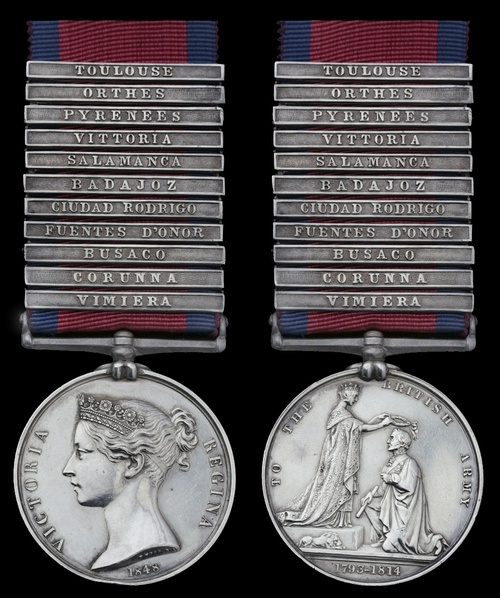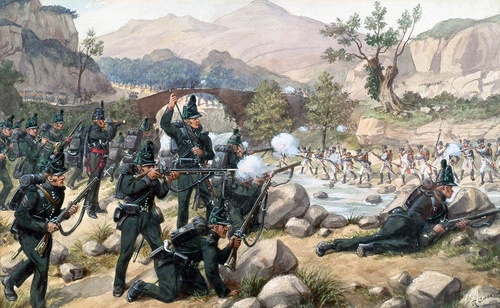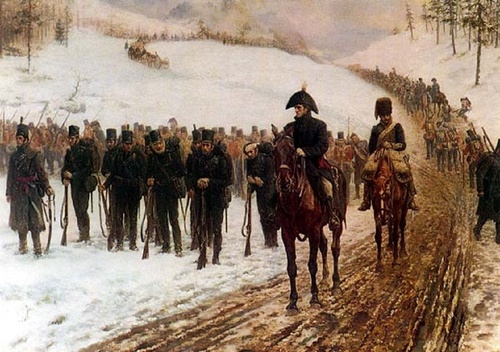Auction: 22002 - Orders, Decorations and Medals
Lot: 123
(x) The superb 11-clasp Military General Service Medal awarded to Private J. Bell, 95th Rifles, a unique combination to a member of the British Army for the Napoleonic Wars
Military General Service 1793-1814, 11 clasps, Vimiera, Corunna, Busaco, Fuentes d'Onor, Ciudad Rodrigo, Badajoz, Salamanca, Vittoria, Pyrenees, Orthes, Toulouse (J. Bell, 95th Foot, Rifles.), very fine
John Bell in confirmed on the Roll for this 11-clasp Medal, additionally noted as being a member of Captain Alexander Cameron's Company in the First Battalion. Fascinatingly, Cameron's men were known as the 'Highland Company' of the 95th: as one would expect with his surname, Cameron hailed from Scotland and had seen previous service in the 92nd (Gordon) Highlanders. Upon transferring to the 'Experimental Corps of Riflemen' (as the 95th were originally known) he played a major part in recruiting approximately 200 men from Lochaber, marching with them to Sussex to join the Rifles: these men and their commander became the mainstay of the 'Highland Company'. Furthermore, Cameron's company was known to have several skilled bagpipers in its' ranks; to this day the Royal Green Jackets (Rifles) Museum holds the original Bellow Pipes played throughout the Peninsular War; though an unusual choice of instrument for a regiment of Light Infantry, undoubtedly the 'skirl of the pipes' inspired such men as Bell when going into battle against the French. It is further worth noting that James Prinsep Beadle's famous painting "The Rear Guard", depicting Brigadier "Black Bob" Craufurd and a number of men of the 95th on the road to Corunna is, by popular repute, additionally believed to depict the very same Cameron and members of his company: is Private Bell amongst them?
The famous green-uniformed 95th Regiment of Foot (Rifles), served throughout the entirety of the Peninsular War - a feat few regiments could boast. Indeed, all three battalions of the regiment fought together in Spain and Portugal from 1810 through to 1814 with much distinction as members of the elite Light Division. On 15 August 1808, in the lead-up to the battles of Rolica and Vimeiro, the 2/95th fired the very first shots of the Peninsular campaign; the 1/95th (Bell's battalion) participated in Sir John Moore's infamous retreat to Corunna, at which place the gallant army commander was killed; under the command of the infamous "Black Bob" they fought at Bussaco, Fuentes d'Onoro and Ciudad Rodrigo, at which siege Craufurd too was killed.
Always out in front of the army due to their training as Light Infantry, and with their Baker Rifles giving them range superiority over the French, they often found themselves in dangerous and exposed positions - not least at the Battle of San Marcial (31 August 1813), when 70 men under Captain Daniel Cadoux held the bridge at Vera for many hours against a whole French Division - 10,000 strong - before finally withdrawing. The 95th Rifles ended the Peninsular War at the Battle of Toulouse, the final action of the campaign - but all three battalions would be reunited not long after, on the fields of Belgium, for the Battle of Waterloo on 18 June 1815. Surely the last words on this famous regiment must go to someone who saw them in action at the Battle of Tarbes on 20 March 1814:
"Our Rifles were immediately sent to dislodge the French from the hills on our left, and our battalion was ordered to support them. Nothing could exceed the manner in which the Ninety-fifth set about the business….Certainly I never saw such skirmishers as the Ninety-fifth...They could do the work much better and with infinitely less loss than any other of our best light troops. They possessed an individual boldness, a mutual understanding, and a quickness of eye, in taking advantage of the ground, which, taken all together, I never saw equalled. They were, in fact, as much superior to the French Voltigeurs as the latter were to our skirmishers in general. As our regiment was often employed in supporting them, I think I am fairly qualified to speak of their merits.'
('Twelve Years’ Military Adventure in Three-Quarters of the Globe', Captain John Blakiston, 1829, refers).
Subject to 5% tax on Hammer Price in addition to 20% VAT on Buyer’s Premium.
Sold for
£10,000
Starting price
£2400









